
Guests
- Mouin RabbaniMiddle East analyst.
- Muhammad Shehadawriter and analyst from Gaza.
- Ori GoldbergIsraeli political analyst and scholar.
President Donald Trump says Israel and Hamas have agreed to the “first phase” of a U.S.-backed ceasefire deal for Gaza. The 20-point roadmap includes a swap of captives and a phased Israeli withdrawal from the Gaza Strip, though details on many of the planks remain sketchy. Democracy Now! spoke with Palestinian and Israeli analysts on how to interpret the peace plan.
“We’re now at a fork in the road,” says Mouin Rabbani, a Palestinian Middle East analyst. “While it’s very welcome, of course, that the genocide may be coming to an end … this is a renewed Oslo process with an even lower political ceiling.” He says there are calls around the globe for a “different paradigm … in which Israeli accountability for its actions replaces these meaningless, endless negotiations about nothing.”
Muhammad Shehada, a writer and analyst from Gaza, is critical of the deal, saying that “as soon as a ceasefire deal is signed, nobody bothers with the details. Gaza disappears, and it’s back to this slow, latent, invisible violence of starvation and engaging people in a permanent state of nonlife.”
Ori Goldberg, an Israeli political analyst and scholar, says that the deal was politically advantageous for Prime Minister Benjamin Netanyahu. “Netanyahu can now be the complete package,” says Goldberg. “Netanyahu was the fearless leader who fought the difficult, inevitable war, but he is now the fearless leader who brings the difficult, inevitable deal.”
Transcript
AMY GOODMAN: This is Democracy Now!, democracynow.org. I’m Amy Goodman, with Nermeen Shaikh.
NERMEEN SHAIKH: To talk more about Hamas and Israel agreeing to the first phase of a ceasefire-hostage deal, we’re joined now by three guests.
Mouin Rabbani, Middle East analyst, co-editor of Jadaliyya and a nonresident fellow at the Center for Conflict and Humanitarian Studies, his latest piece is headlined “Key Points and Prospects of the Israeli-Palestinian Agreement.”
And Ori Goldberg is Israeli political analyst and scholar in Tel Aviv. He’s written extensively on Iran, Israel and the relationship between religion and politics in the Middle East.
AMY GOODMAN: But first we go to Copenhagen, where we’re joined by Muhammad Shehada, a writer and analyst from Gaza, visiting fellow at the European Council on Foreign Relations. His latest piece for +972 Magazine is headlined “Two years after October 7, Palestine has become a graveyard of failed strategies.”
We, though, are going to go first to Mouin Rabbani as we fix some connections.
Mouin, can you respond to this hostage-ceasefire deal? What do we know? What has been laid out? What hasn’t?
MOUIN RABBANI: Well, as you may recall, the Trump-Netanyahu proposal announced at the White House last week dealt with three sets of issues: the immediate ones, meaning an exchange of captives, Israeli withdrawal, humanitarian aid and the cessation of hostilities; then, postwar governance, basically Project Blair, putting him in charge as the viceroy of the Gaza Strip; and thirdly, but only very tangentially, political issues, the crisis that produced this crisis, if you will.
The agreement that was signed yesterday in Egypt deals exclusively with the first set of issues. So, Israel and the Palestinians have agreed on an exchange of captives. We don’t yet know the details of that, in terms of which Palestinians will be released from Israel’s prison system, and according to what schedule. There is a cessation of hostilities, and there’s a statement earlier today that Qatar and the United States have guaranteed that hostilities will not resume. I think those are relatively worthless commitments, because with Trump, you can’t trust a word he says about anything, and Qatar is, of course, not in a position to compel this. And in terms of the Israeli withdrawal, there is an agreed line of withdrawal, but that also hasn’t been clarified publicly. And some of these issues may, in fact, still be under discussion.
The additional issues, postwar governance and the political issues, were entirely ignored. And this is seen as an achievement by Hamas, which very much wanted an agreement on the first set of issues, but was essentially being asked to commit political suicide and to accept national capitulation on behalf of the Palestinians with the other aspects of it.
One point, I think we’re now at a fork in the road, a continuation of this process. While it’s very welcome, of course, that the genocide may be coming to an end and is at least now paused, this is a renewed Oslo process with an even lower political ceiling. And the key issue now is there is massive global momentum for a different paradigm, in which Palestinian rights, in which Israeli accountability for its actions replaces these meaningless, endless negotiations about nothing that result in nothing. And I think that momentum also helps explain why we have this agreement finally, one that the Biden administration systematically refused to implement, but that Trump was able to force Israel to accept with a single phone call. And maintaining and intensifying that momentum is absolutely essential to ensure that the genocide does not resume in full force, that ethnic cleansing remains off the agenda, and that the real political issues can finally be addressed in line with international law and Palestinian rights.
NERMEEN SHAIKH: So, we have Muhammad Shehada now. So, Muhammad, if you could respond to this deal and explain what you think made it possible now? What role did the Gulf states play? You were just in Istanbul. What role did Turkey play?
MUHAMMAD SHEHADA: Well, the main thing that explains it is that tomorrow is the day where the Nobel Prize Committee will announce the Nobel Peace Prize winner. So, that’s the main thing that comes to mind. Otherwise, the second thing is Qatar. After Israel bombed Doha so viciously, Qatar has been demanding a price from the Trump administration. And Trump’s security reassurances that he gave in this executive order are practically worth nothing.
So, you saw, basically, Qatar, the United Arab Emirates, Jordan, Egypt, Turkey and other Arab and Muslim countries meeting with Trump on the sidelines of the U.N. General Assembly and trying to create some momentum towards ending the genocide in Gaza. Trump wanted to end it on Israel’s own terms, which were catastrophic. There was an earlier draft of the deal that was somewhat reasonable. Then Netanyahu spent six hours with Jared Kushner and Steve Witkoff and manipulated it out of any meaning or substance and added to it this colonial aspect of the Trump-Blair Board of Peace.
But what you had is Hamas being advised by Qatar, Turkey and Egypt to deliver a response very carefully that said, “Yes, we agree to the withdrawal of the Israelis from Gaza. We agree to the release of Israeli captives and release of Palestinian captives and hostages. And yes, we agree to the end of the war. But the rest of Trump’s ideas will be delayed until a later point, because we do not have the mandate to negotiate all of all those things. It’s a Palestinian decision.” And it was a clever way of sort of, like, saying yes to the parts that are actually doable, and the parts that were so incredibly fantastical, to leave them at a later point that hopefully will never come.
AMY GOODMAN: Can you just explain for one moment what you mean about the announcement of the Nobel Peace Prize and what bearing that has on these negotiations?
MUHAMMAD SHEHADA: Yeah. So, basically, we’ve been told repeatedly over the last year that Trump’s eyes are the Nobel Peace Prize because Obama got one, so he was very determined to get one, as well, because of that, in particular. And it was one of his driving forces in decision-making, whether it is the trying to get an end to the war in Ukraine or trying to get a ceasefire deal in Gaza. The Nobel Committee is about to announce the winner of the Peace Prize tomorrow, around the middle of the day European time. So, in Israeli media, they’ve been very explicit for days that the only — or, the main reason why Netanyahu could not say no to Trump throughout this last week, or even a little bit before, from the U.N. General Assembly, is because he didn’t want to be seen as the one denying Trump the Nobel Peace Prize. And it’s ironic. It’s psychedelic and crazy, but it is basically one of the political motivations playing here.
NERMEEN SHAIKH: And, Mouin Rabbani, you mentioned earlier the question of the Palestinian prisoners who will be released in exchange for the Israeli hostages who remain in captivity in Gaza. Is there — you said, of course, those names have not been released. But is there any indication that either Marwan Barghouti or the general-secretary of the Popular Front for the Liberation of Palestine, Ahmad Sa’adat, will be among those released?
MOUIN RABBANI: Thus far, there isn’t. So far as I can tell, there’s no clarity that they will or will not be released. Clearly, they’re at the very top of Hamas’s list, and that would also allow it to present itself as acting in the Palestinian national interest, rather than only, let’s say, its factional interest. But, you know, Israeli media have reported that Israel is required to make very painful concessions in the context of this agreement. That may be an indication their names are on the list. But as yet, there is no confirmation about this one way or the other.
NERMEEN SHAIKH: And your response, Mouin, to those who say — I mean, you think, in the piece that you wrote overnight, after the deal was reached, that Hamas has not lost all its leverage by agreeing to release the Israeli hostages. Could you explain why you think that’s the case?
MOUIN RABBANI: Yes. I mean, the idea that retaining the Israeli captives was somehow Hamas’s only guarantee for ending the war is not really one I subscribe to. I think the captives serve as leverage only for the purpose of an exchange with Israel and obtaining the freedom of Palestinian captives in Israel’s prison system. Apart from that, they have primarily served as a pretext, as a pretext for genocide, and they most certainly haven’t served the purpose of defending either Hamas leaders or even a single Palestinian child from this unprecedented genocidal Israeli bombing campaign. And it may, in fact, be the case that releasing them in the context of an exchange and not having any more Israeli captives in the Gaza Strip could make it more difficult for Israel to resume its genocidal military campaign.
But again, you know, this is an agreement. It’s not a peace agreement. It’s a ceasefire agreement, and a partial one. And given Israel’s previous conduct, and even more importantly, U.S. indulgence for Israel’s conduct, the indulgence of the West as a whole, this is a situation where Israel, should it so choose — and it will so choose, I suspect — will find a method to abrogate this agreement and ensure it is only of a temporary nature.
AMY GOODMAN: Muhammad Shehada, your family is from Gaza. You are from Gaza. You’re now in Copenhagen. What have you heard from your family on the ground? And also, you’ve said that this deal was just signed — that was just being agreed on, is the clearest admission by Israel and the U.S. that they’ve deliberately been starving Gaza and that Israel’s been holding thousands of Gazans hostage without trial or charges. I mean, over time, over the decades, Israel has held more than a million Palestinians, detained them. And I think at this point — right? — it’s the highest number of Palestinians held at any one time in Israeli jails.
MUHAMMAD SHEHADA: Yes, absolutely, precisely. So, you have, basically, in the written agreement that Trump released, it said explicitly that in return for Hamas releasing the 20 Israeli living captives, that Israel would release 1,700 Palestinian captives that have been taken after October 7th from Gaza. What that means is that those are people that were not in the October 7th attack when it unfolded, that people that were rounded up — basically, every area that Israel invades in Gaza, they would take people at random, process them with racial profiling. Anyone that they think resembles sort of a religious person, they would take them, or anyone that is a doctor or a journalist or a nurse or an academic, they would take them to the Sde Teiman concentration camp, what Israel’s own B’Tselem, a human rights organization, referred to as a torture camp, and hold them there as a bargaining chip without visits by the Red Cross, without legal counsel, without charges, without trial.
So, I have a friend whose brother was taken this way, and he was only allowed to meet with a lawyer one time. And he’s been asking the Israelis, “Why am I here?” The same answer they gave him over and over and over again is that “You are here until a ceasefire deal is signed, and then you will be released.”
Trump, you heard him saying earlier this year that it only takes — it takes a very sick mind for someone to hold a dead body as a hostage. But little did he know that Israel has been holding hundreds of Palestinian dead bodies way before October 7th. One of them is Noura Erakat’s cousin, who was murdered by the Israelis at a checkpoint in the West Bank on his way to his sister’s wedding, on the day of his sister’s wedding. And Israel has been holding his body ever since. You had at least 250 Palestinian dead bodies that Israel was holding as a bargaining chip, and they collected hundreds more of bodies throughout the genocide that they are holding as what they call strategic assets to use as leverage in negotiations.
The other thing about the starvation is you had in the deal written explicitly that Israel would allow more aid to go into Gaza, which means that Israel had the capacity, the ability all along to allow way more aid to go into Gaza, but they had the clear will to not allow any of this in. We’ve seen it in the previous ceasefire. All the problems that Israel keeps citing as the reasons for the famine disappeared — the looting, the gang violence, the chaos. All of it disappeared, and food was coming in, 600 trucks per day. Now in this agreement, you will have 400 trucks coming through five border crossings, and then it will be scaled up to 600.
The last thing, about family and friends in Gaza, I’ve been calling people on the ground since the morning. There’s the — there’s the sentiment that — of they will believe it only when they see it. And even when they see it — because we’ve been here before multiple times, Amy, in November 2023 or in January this year, or I personally lived through 10 Israeli military operations, three wars and two ground invasions. Each of them ended with a ceasefire agreement where Israel would make promises about ending the siege, the draconian siege on Gaza, or at least reducing it, and as soon as a ceasefire deal is signed, nobody bothers with the details. Gaza disappears, and it’s back to this slow, latent, invisible violence of starvation and engaging people in a permanent state of nonlife. It is expected to be the exact same thing. I’ve been talking to people. They don’t feel anything positive about the declaration, until they see it materialize, and they know that there is a lot of devils in the details. They know Israel has a vested interest in sabotaging the deal throughout.
This morning, Israel even intensified the bombing way more than before. It’s like they are in a rush, in a hurry, to kill as many people as possible and destroy much of the urban space as much as possible. They’ve been detonating those robotic suicide vehicles since yesterday. They’ve been bombing Khan Younis, Deir al-Balah, Gaza City, Al-Sabra, Tel al-Hawa, al-Shati camp. I just saw footage where Israeli tanks are literally bombing people alive on television on the beach, the people that were trying to go back to their homes. One of our colleagues, Motasem Dalloul in Gaza, just lost his third son today, that was murdered by the IDF.
So, on the other side, you have people that are so exhausted, that are desperate for any glimmer of hope. I was just talking to a cousin in his late forties in Gaza City last week, and he looked exactly like my grandfather when he died when he was over 100 years old. He was skin and bone. You can literally see his eyes are sunken, his face is wrinkled and darkened. And those people are desperate for the slightest glimmer of hope. So, hopefully, they will get some good news soon.
NERMEEN SHAIKH: Well, let’s bring in Ori Goldberg. We were just sorting out some technical issues. Ori, if you could respond to the deal and tell us how people in Israel are responding? The hostages are expected to be released on Monday. Of course, there will be the living hostages and also the deceased ones.
ORI GOLDBERG: Well, the only issue that matters to the Israeli Jewish public at large is the fate of the hostages. They absolutely don’t care, in any way, shape or form, about the suffering or the plight of the Palestinians. And even the fate of the hostages is more a myth than it is a pressing national security issue.
Israel has resorted back to discourse that’s familiar to every Israeli postwar, and that is, mistakes were made, people are to blame, we will find them, we will force them to bear responsibility, and then we will rise from the ashes, as we always have, because that is what we do. We will rise. We will make Israel better. We will make it a more robust democracy. We owe it — we owe it to our children, and so forth and so forth. But so, even the issue of the hostages, which is, again, the only reason Israelis have called for an end to the, quote-unquote, “war,” is resonating very much in a human interest kind of way or in a “Finally, this nightmare is over. We can wake up and go back to reality.”
There are Israelis who — especially religious ones, who celebrate overtly the killing of Palestinians. And they, of course, are disappointed. They wanted a total victory. They wanted Hamas destroyed. But the great majority of Israelis enable the genocide and support the genocide by not talking about the genocide.
AMY GOODMAN: Ori Goldberg —
ORI GOLDBERG: It is a genocide by — yes.
AMY GOODMAN: You’re an Israeli political analyst. You’re a scholar based in Tel Aviv. What about Ben-Gvir and Smotrich not supporting the ceasefire, but not pulling out of the government, which would bring it down?
ORI GOLDBERG: Ben-Gvir and Smotrich are less powerful than they may appear from the outside. They’re both sectorial leaders, and there’s a real difference between them. Smotrich is an ideologue. He has an ideological movement behind him, the settlers and what is called religious Zionism, which is also the name of his party. Ben-Gvir is an old-fashioned populist, here to simply torch the place and cause as much mayhem and death and destruction as he can. Both would be lost without their membership in Netanyahu’s government. Both would lack for the executive power they prize so dearly, Smotrich in the West Bank, and Ben-Gvir over domestic security in everything from licenses for carrying weapons to not investigating or enforcing Israeli law on crime, which is rampant in Israeli-Palestinian society. They are not leaders meant for the opposition. They are meant for power, and they know it. And they will find excuses. Perhaps Smotrich will leave. But it’s more likely that they will explain to their base that it’s better that they’re on the inside to prevent even worse decisions from being made.
But I think perhaps it’s more important to talk about Netanyahu himself and why this deal is good for him, not bad for him, because Netanyahu can now be the complete package. Netanyahu was the fearless leader who fought the difficult, inevitable war, but he is now the fearless leader who brings the difficult, inevitable deal. And he is the grown-up in the room. Smotrich and Ben-Gvir are the adolescents. You know, they do whatever they want. They’re juvenile. They have no responsibility. Netanyahu knows what’s what. And he was able to bring the hostages back. And should a snap election be called in Israel over the next six months — there’s very good chance that it will — that makes Netanyahu perhaps the most favored candidate to win the prime ministership again.
NERMEEN SHAIKH: And, Ori, if you could respond to what our guests earlier were saying, some understandable skepticism about whether Israel will abide by the agreement, and if so, to what extent?
ORI GOLDBERG: Skepticism is well founded. If I was a Palestinian, I wouldn’t trust an official Israeli farther than I could throw him.
But I think we need to take into consideration the fact that, certainly over the past two months, Israel’s international stature and Israel’s absolute impunity have taken real hits. Israel is not as strong as it was even two months ago. And the notion that Israel always dictates the pace of events, that was the grand prize for which Netanyahu fought. He wanted to demonstrate that Israel can do whatever it wants to whomever it wants, wherever it wants. That is not the case anymore. Despite the reluctance, despite the alliances, the criminal alliances between Israel and global leaders, Israel simply cannot have its way every time. And that, in and of itself, I think, is grounds enough to assume that the situation now is different.
Add to that the fact that the Israeli public considers itself to have undergone the very difficult two years, sees itself as unrightfully victimized by its own government and by every global leader out there, an Israeli public that just wants to get back to normal, which means to repress the fact of the occupation and to return to life as a Jewish and democratic state, effectively an ethnocracy built on Jewish supremacy.
Netanyahu knows this. He knows this very well. Netanyahu is not an aberration. He’s not an anomaly. He’s the quintessential Israeli prime minister. That’s why he keeps winning, not because he’s a magician who pulls cards out of his sleeve, because he knows this, this is what Israelis approve of. And consistent polling shows that he’s right. While Israelis may have protested his government, while certain sectors of Israeli society did not see themselves aligned with his ministers, the great majority of Israeli Jews supported his government’s policies in Gaza. That is not something that can be wished away. That is still true. His would-be competitors, his would-be heirs from the opposition have never said anything that differed significantly from the genocidal policies we’ve seen for the past two years in Gaza. Netanyahu knows this, and he is using this, as any savvy politician would, to situate himself for further battles.
NERMEEN SHAIKH: So, Ori, you said that this signals basically the end of Israeli impunity on the global stage. Do you think that applies to the U.S., as well?
ORI GOLDBERG: I do, because I don’t think Trump is beholden to Israel even remotely — even as remotely when you consider the way Joe Biden was beholden to Israel. I think the American political map is changing. I think public opinion in the United States is changing. I think it’s become very much almost basic principle that America should not be forced to fund foreign wars, especially foreign wars that turn into genocides. I think Trump is hearing that incessantly from his own base. I think Trump is under pressure from that base, not because of the genocide, but because of the Epstein files and because of his behavior within, you know, American politics, because of the government shutdown. I think all of these political interests are converging.
And that is why I am, you know, cautiously optimistic about the potential of this deal, because this isn’t about the Palestinians. None of the major players here care about the Palestinians, except for the people who represent the Palestinians. None of them care about the Palestinians. Everybody has something to gain from this deal, that has to do with their political future, their political survival. And at this time, after two years, when the world ignored the Israeli genocide, perhaps the only thing that can start a process in motion is when the stars align and political interests converge.
AMY GOODMAN: Finally, Ori, if you can talk about the significance of, apparently, President Trump going to Israel, Netanyahu inviting him to address the Knesset, the Israeli parliament, as early as Sunday?
ORI GOLDBERG: All that is political pageantry. We’re used to it in Israel. Having an American president address the Knesset usually is something that goes with the signing of a peace treaty. We have to keep in mind, of course, obviously, as your other guests have said, that this is not a peace treaty. There’s no peace after a genocide. This perhaps, perhaps, signals the end of the beginning. It’s a ceasefire. It is a cessation of death and, hopefully, a cessation of a massacre. And the fact that Trump claims this is his privilege, perhaps that would be a consolation prize when he’s not awarded the Nobel Peace Prize in Oslo.
AMY GOODMAN: Ori Goldberg, we want to thank you for being with us, Israeli political analyst and scholar outside Tel Aviv in Herzliya. We also want to thank Muhammad Shehada, a writer and analyst from Gaza, visiting fellow at the European Council on Foreign Relations, and, finally, Mouin Rabbani, Middle East analyst, co-editor of Jadaliyya, a nonresident fellow at the Center for Conflict and Humanitarian Studies.
Coming up, we go to Paris, where one of the hundreds of Global Sumud Flotilla activists who were abducted by Israel on the high seas and detained is now. We’ll speak with Progressive International’s David Adler and hear comments from Mandla Mandela, the former South African MP and grandson of Nelson Mandela, both just released.

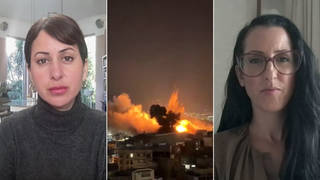
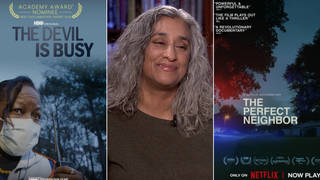

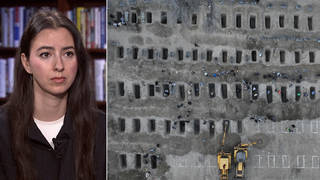




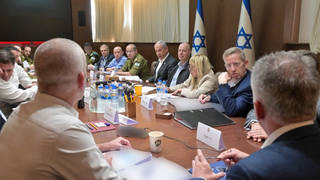
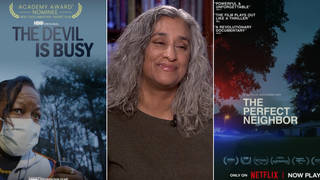
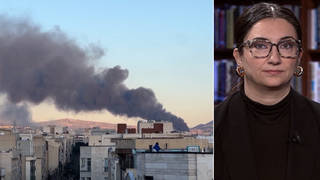
Media Options